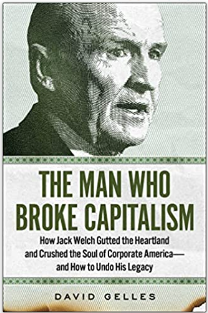Weekend reading: Jack Welch and profits-first ideology
David Gelles. The Man Who Broke Capitalism: How Jack Welch Gutted the Heartland and Crushed the Soul of Corporate America—and How to Undo His Legacy. Simon & Schuster, 2022 (264 pages).

One good thing about being stuck in Covid quarantine (mild case: 3 days of fever but no other symptoms for the last 5 days), is that I got to read this book. I think it is hugely important and makes a compelling, if depressingly realistic, case for how corporate profit-first ideology has badly damaged American democracy.
I’m a fan of David Gelles, who writes for the Times about corporate malfeasance. I’ve also been interested in Jack Welch since I read an article in Fortune magazine about how a speech he gave in 2001 was responsible for kicking off the Shareholder Value movement.
This was the push to give stockholders immediate higher returns on investment and made growth in profits the sole corporate goal (a big shift from blue chip stocks like IBM, which promised slow but steady returns over a long time period).
Gelles explains what this did to corporations and what they then did to America. Companies like Welch’s General Electric, which made toasters and household electrics, fired employees, outsourced labor, cut all possible costs, merged and acquired, manipulated earnings, and forgot about ethics let alone social responsibility. Boeing, infamously, did the same. Hence plane crasshes and deaths.
Other results: destruction of the environment, loss of manufacturing, and the evaporation of decent working- and middle class incomes and the transfer of their wealth to stockholders and especially to corporate executives. Hence their obscene salaries and compensation.
Gelles also describes the widespread acceptance of profits first, the ignoring of its consequences, and the collusion of Wall Street and the government in this destructive system.
Food companies are no exception. I have long attributed the push to sell ultraprocessed junk food—regardless of its health consequences—as a result of what Jack Welch started.
Interestingly, Gelles cites a food company, Unilever, as an example of a corporation that is trying to put social values back in the picture.
He says others should follow Unilever’s example, and cites the 2019 statements by the World Economic Forum and the Business Roundtable to suggest that maybe business is finally catching on to the need for change. (See my incredulous post on these statements)
I think he may be too optimistic. As he admits on page 223, this is what actually happened during the pandemic:
One study showed that companies that signed the Business Roundtable statement were actually more likely to announce layoffs in the first months of the pandemic than companies that didn’t sign the statement, and that the companies that pledged to serve all stakeholders actually distributed more of their profits to shareholders than those who didn’t publicly pledge to look out for the common good.
So much for promises.
As a Lancet Commission said early in 2019, if we want social values to matter in business, government is going to have to start regulating. For that to happen, we need much greater demand from civil society.
This book makes a strong case for the need to change the way corporations operate. Let’s get to work.


